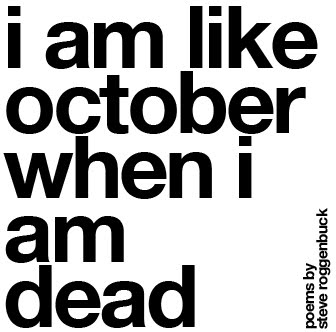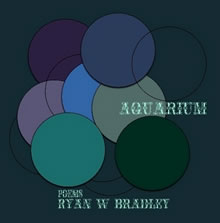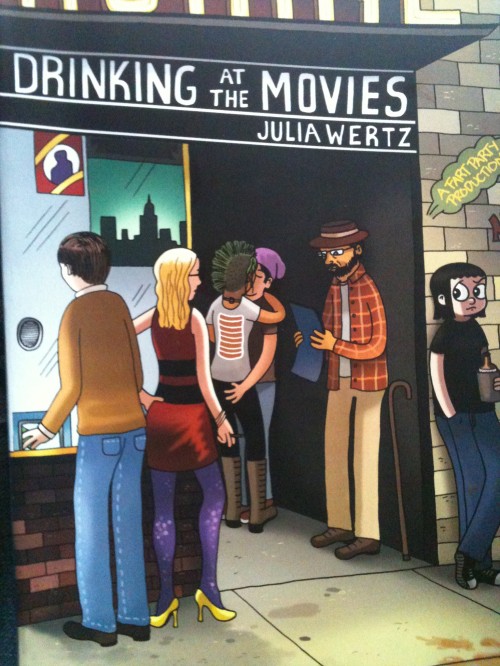i am like october when i am dead poems by steve roggenbuck
18pp published by Steve Roggenbuck (2011)
 Steve Roggenbuck is not Robert Frost. His poems avoid forests of metaphors. Although they might give you a woody. Roggenbuck’s poems are not pedestrian, but peripatetic. They get you to think, just a little bit, about murder and loss. They also make you look into a night sky and wonder what you had for lunch or what’s on TV. Roggenbuck’s poems hold up dead flowers, then make you leave the room after declaring that that’s all there is. They are rakish, shake a giant rake to scare you, gather dead leaves outside the church of poetry, walk an elephant into that strange part of you called consciousness. Steve Roggenbuck’s poems will choke your dad for your birthday. They don’t care. They will not answer your calls. They are alive with the memories of killers, wonder what they will harvest, then stuff dogs into garbage trucks. These poems are the eraser of two hundred years of American poetry, the shout at the end of a sentence that seeks always a little bit of anarchy, a car on fire. Roggenbuck’s poems are the beginning of a great career.
Steve Roggenbuck is not Robert Frost. His poems avoid forests of metaphors. Although they might give you a woody. Roggenbuck’s poems are not pedestrian, but peripatetic. They get you to think, just a little bit, about murder and loss. They also make you look into a night sky and wonder what you had for lunch or what’s on TV. Roggenbuck’s poems hold up dead flowers, then make you leave the room after declaring that that’s all there is. They are rakish, shake a giant rake to scare you, gather dead leaves outside the church of poetry, walk an elephant into that strange part of you called consciousness. Steve Roggenbuck’s poems will choke your dad for your birthday. They don’t care. They will not answer your calls. They are alive with the memories of killers, wonder what they will harvest, then stuff dogs into garbage trucks. These poems are the eraser of two hundred years of American poetry, the shout at the end of a sentence that seeks always a little bit of anarchy, a car on fire. Roggenbuck’s poems are the beginning of a great career.
* * *
The Day Was Warm and Blue poems by Richard Loranger
28pp published by Richard Loranger (2002)
 Richard Loranger is gay. He remembers the colors, temperatures of his mornings. Some of these simple memories become poems. Like the twenty-eight poems contained in this book. However, Loranger’s poems are not really contained. Or, if they are, they are contained the same way a sky is contained: warm and blue. But, peculiar. Very, very peculiar. Each poem is a tiny ass-fuck on the same day you kill your boss. Each one is there, with you, because there is nothing else to do. This makes them wonderful. Loranger’s poems are pretty butterflies. They flutter through a room and are closely listened to, but only after they have been eaten. They gather dead leaves outside the church of poetry, put them on a shelf, forget them, maybe. If Loranger had the time he would write these poems upon a wall using his own urine. They are that simple and that marvelous. And who knows? Perhaps he already has. Each of these poems are a little song that drifts by. They are the shadow of an acrobat tumbling in air, a cat in each eye. They are a drink of water after an argument, the mystery of television. Doused in gasoline, simple, lyrical, they want to know who’s in charge, will only listen to the secrets of plants, then wait quietly, to get the names they need to celebrate their small fire. Time has nothing to do with them. I mean, who needs time? These poems keep going on and on, each in their little, magnificent way, all warm and blue.
Richard Loranger is gay. He remembers the colors, temperatures of his mornings. Some of these simple memories become poems. Like the twenty-eight poems contained in this book. However, Loranger’s poems are not really contained. Or, if they are, they are contained the same way a sky is contained: warm and blue. But, peculiar. Very, very peculiar. Each poem is a tiny ass-fuck on the same day you kill your boss. Each one is there, with you, because there is nothing else to do. This makes them wonderful. Loranger’s poems are pretty butterflies. They flutter through a room and are closely listened to, but only after they have been eaten. They gather dead leaves outside the church of poetry, put them on a shelf, forget them, maybe. If Loranger had the time he would write these poems upon a wall using his own urine. They are that simple and that marvelous. And who knows? Perhaps he already has. Each of these poems are a little song that drifts by. They are the shadow of an acrobat tumbling in air, a cat in each eye. They are a drink of water after an argument, the mystery of television. Doused in gasoline, simple, lyrical, they want to know who’s in charge, will only listen to the secrets of plants, then wait quietly, to get the names they need to celebrate their small fire. Time has nothing to do with them. I mean, who needs time? These poems keep going on and on, each in their little, magnificent way, all warm and blue.
* * *
Aquarium poems by Ryan W Bradley
26pp published by Thunderclap Press (2010)
 Ryan Bradley is straight. He eats lots of spaghetti. He sees pornography everywhere. His poems are a testament to that vision: defiant, sexy, sometimes late for class. It is a teenager’s world. Bombs go off like songs on the radio. And Bradley listens, makes them pretty, finds the wonder in flashing red lights, women falling from the sky, a city on fire. Bradley’s poems attempt to feel things. That is, they are thinking: About the next cigarette, cheerleaders buried under ice, a sudden sensation that slants everything, makes you walk funny. It likes girls, smoke, the Beatles. But best of all, they get depressed in the summer, still believe in the alcoholism of the blues, disguise their social class because these were born poor. Sex and death. It’s all here in these poems. And if you aren’t drunk by page two, you will be by page twenty-six. Drunk and slightly bruised. And touched, lightly. Because Bradley’s hand is light, might even take you far away. Imagine particles, the flash of fireflies, the nakedness of desire—cells rapidly dividing—spread over noodles. These poems are peppered with neighbors singing opera, but Bradley also wants to hear your eyelids closing. He’s sweet. These poems are sweet. All of them, underwater.
Ryan Bradley is straight. He eats lots of spaghetti. He sees pornography everywhere. His poems are a testament to that vision: defiant, sexy, sometimes late for class. It is a teenager’s world. Bombs go off like songs on the radio. And Bradley listens, makes them pretty, finds the wonder in flashing red lights, women falling from the sky, a city on fire. Bradley’s poems attempt to feel things. That is, they are thinking: About the next cigarette, cheerleaders buried under ice, a sudden sensation that slants everything, makes you walk funny. It likes girls, smoke, the Beatles. But best of all, they get depressed in the summer, still believe in the alcoholism of the blues, disguise their social class because these were born poor. Sex and death. It’s all here in these poems. And if you aren’t drunk by page two, you will be by page twenty-six. Drunk and slightly bruised. And touched, lightly. Because Bradley’s hand is light, might even take you far away. Imagine particles, the flash of fireflies, the nakedness of desire—cells rapidly dividing—spread over noodles. These poems are peppered with neighbors singing opera, but Bradley also wants to hear your eyelids closing. He’s sweet. These poems are sweet. All of them, underwater.
– – –
Janey Smith (b. March 30, 1981, Anaheim, California) was born on the same day that President Ronald Reagan was almost assassinated. She likes to think her birth had something to do with it. Janey lives in San Francisco, CA.
 Here’s a chance to win a copy of Maureen Thorson’s Applies to Oranges, which is one of the top five most beautiful books of 2011. No doy, it comes from Ugly Duckling Presse so that means it’s impeccably designed and intentionally detailed: good paper, letterpress cover, set in a typeface I hadn’t heard of (Bembo). But I don’t let that overshadow the poetry, which I first read and thought, “Damn, these are consistent.” They are the melt-in-your-mouth variety. You read one in a comfy chair after work and let it mellow. There’s an orange in every poem, and every poem is about 15 lines long and just one stanza. Earlier I thought the poems were quiet, but reading the book again now I realize no not quiet, tense. For instance, this sartorial sorrow:
Here’s a chance to win a copy of Maureen Thorson’s Applies to Oranges, which is one of the top five most beautiful books of 2011. No doy, it comes from Ugly Duckling Presse so that means it’s impeccably designed and intentionally detailed: good paper, letterpress cover, set in a typeface I hadn’t heard of (Bembo). But I don’t let that overshadow the poetry, which I first read and thought, “Damn, these are consistent.” They are the melt-in-your-mouth variety. You read one in a comfy chair after work and let it mellow. There’s an orange in every poem, and every poem is about 15 lines long and just one stanza. Earlier I thought the poems were quiet, but reading the book again now I realize no not quiet, tense. For instance, this sartorial sorrow:

 from Julio Cortázar, The Art of Fiction #83 in The Paris Review (via Matt Bell)
from Julio Cortázar, The Art of Fiction #83 in The Paris Review (via Matt Bell)

 Steve Roggenbuck is not Robert Frost. His poems avoid forests of metaphors. Although they might give you a woody. Roggenbuck’s poems are not pedestrian, but peripatetic. They get you to think, just a little bit, about murder and loss. They also make you look into a night sky and wonder what you had for lunch or what’s on TV. Roggenbuck’s poems hold up dead flowers, then make you leave the room after declaring that that’s all there is. They are rakish, shake a giant rake to scare you, gather dead leaves outside the church of poetry, walk an elephant into that strange part of you called consciousness. Steve Roggenbuck’s poems will choke your dad for your birthday. They don’t care. They will not answer your calls. They are alive with the memories of killers, wonder what they will harvest, then stuff dogs into garbage trucks. These poems are the eraser of two hundred years of American poetry, the shout at the end of a sentence that seeks always a little bit of anarchy, a car on fire. Roggenbuck’s poems are the beginning of a great career.
Steve Roggenbuck is not Robert Frost. His poems avoid forests of metaphors. Although they might give you a woody. Roggenbuck’s poems are not pedestrian, but peripatetic. They get you to think, just a little bit, about murder and loss. They also make you look into a night sky and wonder what you had for lunch or what’s on TV. Roggenbuck’s poems hold up dead flowers, then make you leave the room after declaring that that’s all there is. They are rakish, shake a giant rake to scare you, gather dead leaves outside the church of poetry, walk an elephant into that strange part of you called consciousness. Steve Roggenbuck’s poems will choke your dad for your birthday. They don’t care. They will not answer your calls. They are alive with the memories of killers, wonder what they will harvest, then stuff dogs into garbage trucks. These poems are the eraser of two hundred years of American poetry, the shout at the end of a sentence that seeks always a little bit of anarchy, a car on fire. Roggenbuck’s poems are the beginning of a great career. Richard Loranger is gay. He remembers the colors, temperatures of his mornings. Some of these simple memories become poems. Like the twenty-eight poems contained in this book. However, Loranger’s poems are not really contained. Or, if they are, they are contained the same way a sky is contained: warm and blue. But, peculiar. Very, very peculiar. Each poem is a tiny ass-fuck on the same day you kill your boss. Each one is there, with you, because there is nothing else to do. This makes them wonderful. Loranger’s poems are pretty butterflies. They flutter through a room and are closely listened to, but only after they have been eaten. They gather dead leaves outside the church of poetry, put them on a shelf, forget them, maybe. If Loranger had the time he would write these poems upon a wall using his own urine. They are that simple and that marvelous. And who knows? Perhaps he already has. Each of these poems are a little song that drifts by. They are the shadow of an acrobat tumbling in air, a cat in each eye. They are a drink of water after an argument, the mystery of television. Doused in gasoline, simple, lyrical, they want to know who’s in charge, will only listen to the secrets of plants, then wait quietly, to get the names they need to celebrate their small fire. Time has nothing to do with them. I mean, who needs time? These poems keep going on and on, each in their little, magnificent way, all warm and blue.
Richard Loranger is gay. He remembers the colors, temperatures of his mornings. Some of these simple memories become poems. Like the twenty-eight poems contained in this book. However, Loranger’s poems are not really contained. Or, if they are, they are contained the same way a sky is contained: warm and blue. But, peculiar. Very, very peculiar. Each poem is a tiny ass-fuck on the same day you kill your boss. Each one is there, with you, because there is nothing else to do. This makes them wonderful. Loranger’s poems are pretty butterflies. They flutter through a room and are closely listened to, but only after they have been eaten. They gather dead leaves outside the church of poetry, put them on a shelf, forget them, maybe. If Loranger had the time he would write these poems upon a wall using his own urine. They are that simple and that marvelous. And who knows? Perhaps he already has. Each of these poems are a little song that drifts by. They are the shadow of an acrobat tumbling in air, a cat in each eye. They are a drink of water after an argument, the mystery of television. Doused in gasoline, simple, lyrical, they want to know who’s in charge, will only listen to the secrets of plants, then wait quietly, to get the names they need to celebrate their small fire. Time has nothing to do with them. I mean, who needs time? These poems keep going on and on, each in their little, magnificent way, all warm and blue. Ryan Bradley is straight. He eats lots of spaghetti. He sees pornography everywhere. His poems are a testament to that vision: defiant, sexy, sometimes late for class. It is a teenager’s world. Bombs go off like songs on the radio. And Bradley listens, makes them pretty, finds the wonder in flashing red lights, women falling from the sky, a city on fire. Bradley’s poems attempt to feel things. That is, they are thinking: About the next cigarette, cheerleaders buried under ice, a sudden sensation that slants everything, makes you walk funny. It likes girls, smoke, the Beatles. But best of all, they get depressed in the summer, still believe in the alcoholism of the blues, disguise their social class because these were born poor. Sex and death. It’s all here in these poems. And if you aren’t drunk by page two, you will be by page twenty-six. Drunk and slightly bruised. And touched, lightly. Because Bradley’s hand is light, might even take you far away. Imagine particles, the flash of fireflies, the nakedness of desire—cells rapidly dividing—spread over noodles. These poems are peppered with neighbors singing opera, but Bradley also wants to hear your eyelids closing. He’s sweet. These poems are sweet. All of them, underwater.
Ryan Bradley is straight. He eats lots of spaghetti. He sees pornography everywhere. His poems are a testament to that vision: defiant, sexy, sometimes late for class. It is a teenager’s world. Bombs go off like songs on the radio. And Bradley listens, makes them pretty, finds the wonder in flashing red lights, women falling from the sky, a city on fire. Bradley’s poems attempt to feel things. That is, they are thinking: About the next cigarette, cheerleaders buried under ice, a sudden sensation that slants everything, makes you walk funny. It likes girls, smoke, the Beatles. But best of all, they get depressed in the summer, still believe in the alcoholism of the blues, disguise their social class because these were born poor. Sex and death. It’s all here in these poems. And if you aren’t drunk by page two, you will be by page twenty-six. Drunk and slightly bruised. And touched, lightly. Because Bradley’s hand is light, might even take you far away. Imagine particles, the flash of fireflies, the nakedness of desire—cells rapidly dividing—spread over noodles. These poems are peppered with neighbors singing opera, but Bradley also wants to hear your eyelids closing. He’s sweet. These poems are sweet. All of them, underwater.
